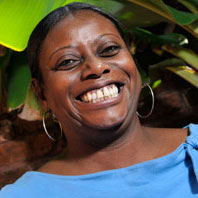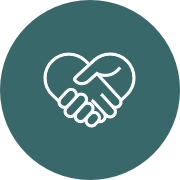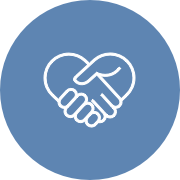
‘This place is a new start’
Joann is a U.S. Army veteran who spiraled into depression after her youngest son died in 2006. She was homeless and almost hopeless when she came to Womanspace in New Orleans – where her life, slowly but surely, began to turn around.
“I lost everything,’’ Joann says. “The only thing I had when I came to Womanspace was my clothes. It’s no joke, being homeless. I didn’t have a place to wash, didn’t have a bed to lay down in. To wake up to that every day …”
The memories come flooding back, and her eyes fill with tears.
“I used to be so mad, so bitter,’’ says Joann, whose oldest son Anthony is veteran of two tours of Iraq. “But this place is a new start. I have a job now. This would not have happened if not for Womanspace. They made it happen for me. If I wasn’t here, I never would have got this job – and I don’t think I ever would have been happy again.”
Joann works in housekeeping at the local hospital, and like many of the homeless women who come to Womanspace suffering from mental illness, chemical addiction, or both, she was down to her last chance. On any given night in America, more than 150,000 veterans are homeless, according to the Department of Veterans Affairs. In New Orleans, where the homeless population has more than doubled since Katrina, the problem is even more intense. The simple fact is that many other programs will not take homeless vets who suffer from PTSD or depression, considering them too dangerous.
Womanspace takes everyone. Since it was founded by Resources for Human Development in 1999, it always has.
“Our target population is the people other programs won’t take – chronically mentally ill homeless women who have severe issues with socialization,’’ Womanspace director Michele Vick says. “All the programs that won’t take them will call us. We’re the best-kept secret in town.”
Vick was Womanspace’s first director, and she’s returned to the program to help in its time of desperate need. Womanspace is struggling to survive in a post-Katrina New Orleans that is losing social services even as the need for them increases. There’s a vital need for Womanspace, a safe haven program that takes in chronically homeless women other shelters won’t take or can’t take, and providing a safe and nurturing environment for them to stabilize before moving into treatment or transitional housing.
“Trust is paramount. At first they perceive you as people that are always closing the door,’’ Vick says. “You can’t push them, because they’ve had doors closed in their faces for years. They’ve been locked up, and that’s not the way to treat mental illness. They’re non-trusting, they’ve been raped, they’ve been abused, they’ve had everything stolen from them.
“Some days you leave, and you’re just drained. But it’s worth it to see the minute, small incremental steps.’’
This summer several of the ladies at Womanspace piled into a bus to drive to the state capitol hoping to argue against the state cutting funds for programs like Womanspace. Jean, who had been homeless for years before coming to Womanspace, wrote a speech she planned to give to the governor that read: “Take a look around. Mental illness can affect anyone. It does not discriminate. We need to take this seriously. But together we can make a difference.”
But they never got a chance to be heard.
“We’re on life support,’’ Vick says. “We’ve had to cut down to the bare bones. Our cook drives women to the mental health center. Our maintenance man washes clothes. The people here extend themselves for the population. They go beyond the call; they’re remarkable.
“It would be a disservice to close us; we’re the only safe haven for women in Louisiana.’’
Antoinette had been homeless between hospital stints, and had been institutionalized off and on for seven years before coming to Womanspace.
“I liked the peacefulness to it, the comfort of the backyard. It’s safe here,” she says. “I’m blessed as far as the eye can see. I was down in the dumps, and the Lord picked me up and brought me here. I was drowning. I couldn’t see. When I found this place, it’s my refuge. It’s a place where I can be at peace, where I can rest.”
Linda had been homeless for longer than she could remember. With the help of Womanspace, she is now living in her own apartment. But she still returns some afternoons to visit and sit in the garden she and the women of Womanspace planted in the courtyard.
“I like it here so much, I don’t want to leave,’’ Linda says. “I just come back to socialize, because I like being with the girls. I’ve come a long way. It’s hard on the street. Hard. You don’t want to be out there. I fell in love with this place. It wasn’t hard to be here; it was easy. Other places refused to take me in. They wouldn’t take me. This place took me in. I’m so thankful for that.”
Joye served 31 years in the Army. She’s a Vietnam veteran and a former POW, diagnosed with PTSD and chronic depressive disorder.
“This was the only place that would take me, with my military background,’’ Joye said. “None of the other places would touch me. They were afraid I’d go on a killing spree. But here, they know I’m not a psychotic killer. They don’t treat me that way.
“No one is planning for the long term. No one is looking at the big picture. It’s short-sighted. There are bigger problems coming down the pike; there are so many kids coming home from Iraq and Afghanistan with serious mental illness. Nobody is planning for that. But it’s happening. Ignore that at your peril.
“There’s going to be more and more like me.”
In spite of growing challenges, Womanspace is determined to be there for them.


